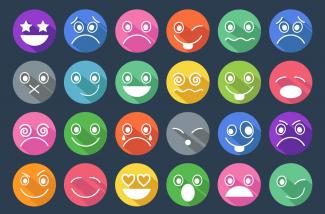Mood Food

In my last post I discussed how eating habits and lifestyle can affect how we feel and our state of mind. For example, we can help maintain our mood by eating at regular intervals (every 4 hours), which helps keep blood sugar levels steady, ensuring that our body has a continuous source of fuel. This not only assists in maintaining good mood, but also assists in keeping good concentration and our mind focused throughout the day. In addition, this prevents us from getting too hungry which means we're less likely to overeat in our next meal.
In today's post I am going to discuss how specific foods can help us feel happier and more energized and which foods to avoid.
We know that eating a sweet snack, such as gummy bears or a candy bar, will give us a spike in energy which is quickly followed by a crashing low. Sugar highs and lows are just one example of the many ways that food can affect how we feel. There are a number of foods that negatively affect our mood and I recommend that you try to limit and in some cases even avoid these foods.
The most common ones are rich in simple sugars for example: candy, jam, soda, fruit juice, syrups and alcohol. Refined white starches (also known as simple carbohydrates) such as white bread, white rice and white flour pasta. The simple sugars found in these foods cause our blood sugar levels to go up and down like a rollercoaster. These spikes and drops in blood sugar levels leave us feeling tired and cranky.
Foods that improve our mood
1. Protein
Protein helps slow carbohydrate absorption in blood. In other words, it slows the blood sugar peak, and increases the release of dopamine and norepinephrine. These are chemicals in our brain that may improve mood and energy levels for a number of hours after eating.
Foods rich in protein:
•Eggs
•Chicken
•Tofu
•Yoghurt
•Fish
2. Vitamins
Vitamin D - helps relieve some mood disorders–for example seasonal affective disorder. Sunlight is the best source but we can also find Vitamin D in:
•Egg yolk
•Sardines
•Low fat milk and cheese
•Soya
Vitamin B12 and folate may help ease depression.
Foods rich in Vitamin 12:
•Salmon
•Lean beef
Foods rich in folate:
•Broccoli
•Oranges
•Dark leafy greens
3. Fiber
Complex carbohydrates contain soluble fiber, which slows the absorption of sugar into the blood and increases serotonin levels, the brain's "feel good" chemical, both of which decrease mood swings.
Foods rich in fiber:
•Oats
•Beans
•Apples
I hope that this post will help you choose foods that make you feel happier and avoid foods that make you feel worse. Enjoy!
